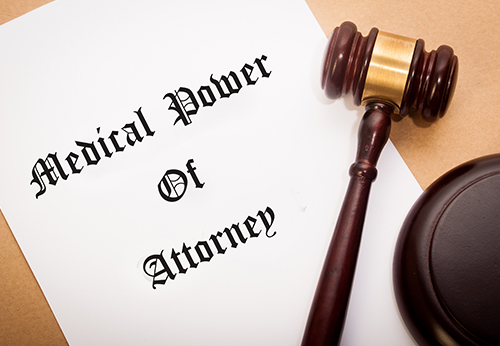Who May Need A Power Of Attorney?
 In this article, you will learn:
In this article, you will learn:
- How a power of attorney works
- Who can make a power of attorney
- When it’s too late to make a power of attorney
We all may need a power of attorney in case we lose our ability to make decisions because of an accident, stroke, or dementia, even if we are young. Still, most powers of attorney are activated by people who are older, who are a little bit afraid that perhaps they could lose their ability to make good decisions. They want to ensure they have something set up in advance to have other people lined up to take care of business or healthcare issues in case they become unable to do so. We like to do two types of powers of attorney: one for financial matters and one for medical matters. With back-up agents, so if the first choice can’t do the job, we’ve got alternates that can jump in and take over.
A Power Of Attorney Explained
A power of attorney is a legal document that gives another person the right to make financial and medical decisions for you. Often, they are combined. Our practice is to keep them separate because folks tend to pick somebody else to be their healthcare power of attorney versus somebody that they might want to manage their financial affairs. So, it’s a legal document that transfers the baton to another, and it’s important when people experience mental decline and may need to have others help them in the event of a disability.
Someone With Dementia, Alzheimer’s, Or Other Cognitive Impairments Ability To Make Legal Decisions
The need for help depends on the level of difficulty that individual may find themselves in. These types of Lewy body or Alzheimer’s, memory loss, or another unfortunate disease, start out mild and then progress to become more serious. So, it’s a question of relativity. Typically, we do work with our clients and help them make good decisions by planning with wills and trusts at the early stages of their dementia to get things under control as quickly as we can–before things go further downhill. So, the answer is yes, even though there may be a diagnosis, we can, in many cases, still do a lot to get the planning started for the future.
How To Get A Power Of Attorney For A Parent Who Has Dementia, Alzheimer’s Or Cognitive Decline?
That can be a challenge at certain times with certain parents. Most parents are generally okay with passing the baton to others, but from time to time, we will encounter parents who are resistant; they don’t want to give up control. They are afraid if they do that, people will steal their money, even family members, and that family members will make bad healthcare and financial decisions. We run into that occasionally, but most of the time, the folks we work with are fine with doing powers of attorney.
Important to note: If you or a loved one ever plan to apply for Medicaid now or later, the financial power of attorney must have very special gifting language in it. Most don’t. Ours do. Take care here.
More Information:
The Power Of Attorney Planning That Can And Should Be Done When A Parent Is In The Early Stages Of Cognitive Decline
A medical diagnosis can make things a bit fuzzy. When dealing with cognitive decline or memory loss. Everybody over the age of 60 runs into that question they ask themselves all the time. But I think that it’s critical for folks to get powers of attorney as quickly as possible, especially when they sense a decline. It gives the family a greater opportunity with a properly drafted power of attorney, to do some asset protection planning later through gifting and other techniques that are critical to preserving the estate, so everything doesn’t go down the drain to a nursing home. When folks learn about the cost, even in the early stages of decline, they will be eager to sign powers of attorney and get their family members in a position to take action when things get even worse.
The Power Of Attorney Planning That Can And Should Be Done When A Parent Is In Mid To Late-Stage Cognitive Decline
When folks are in my office, I’m faced with having to determine whether they can understand what a power of attorney is, and who they would select to serve in the position as agent under a power of attorney. It gets dicey in the mid to late stage. I will often back away and say I don’t think this is going to work. For example, if mom doesn’t understand what’s going on, and can’t remember what happened fifteen minutes ago, it might not be a good idea to do a power of attorney. Although there is a school of thought that says “who would know” that she didn’t have the power to understand. Well, that’s a sketchy way to try to get out from under that dilemma. The lesson here is that the earlier the better to get a power of attorney so there is no one questioning the efficacy of the document.
For more information on Powers Of Attorney In The State Of Colorado, a free initial consultation is your next best step. Get the information and legal answers you are seeking by calling (303) 758-0680 today.

Call For Your Free 20-Minute Consult
(303) 758-0680


